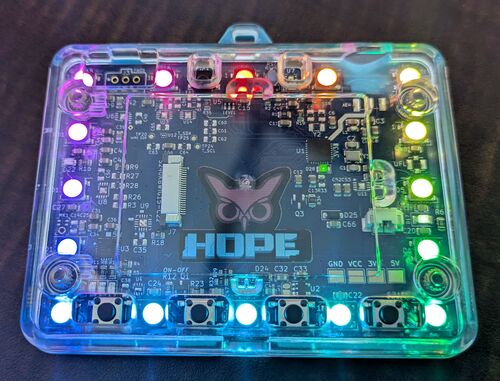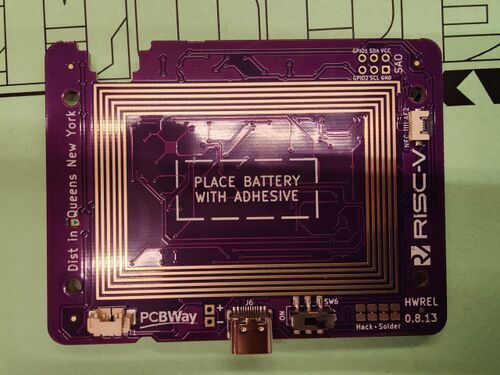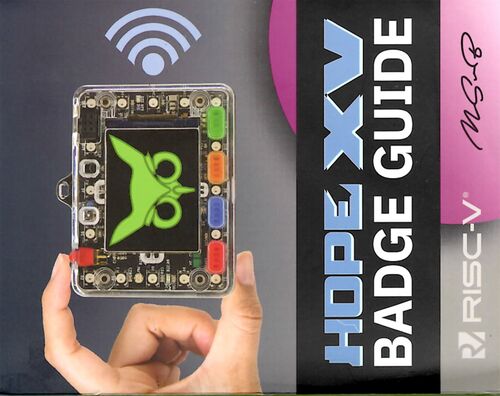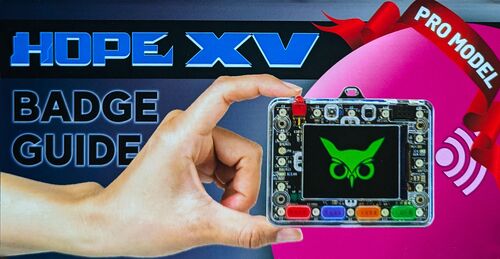HOPE XV Electronic Badge: Difference between revisions
Cyberhiker (talk | contribs) Started adding button info |
Add ESPHome |
||
| (14 intermediate revisions by 4 users not shown) | |||
| Line 1: | Line 1: | ||
[[File: | [[File:HOPE_XV_electronic_badge_photo_front.jpg|thumb|500px|The HOPE XV Electronic Badge PCB (front)]]<br> | ||
[[File:Hopexv-badge-back.jpg|thumb|500px|The HOPE XV Electronic Badge PCB (back)]]<br> | [[File:Hopexv-badge-back.jpg|thumb|500px|The HOPE XV Electronic Badge PCB (back)]]<br> | ||
= Firmware = | = Firmware = | ||
<Must-still-be-uploaded> | <Must-still-be-uploaded><br> | ||
hopebadge-0.8.14.bin | hopebadge-0.8.14.bin | ||
Or flash it with ESPHome, which is an easy way to write firmware for your badge: | |||
https://github.com/fortuna/ESPHomeBadge | |||
= Badge Clinic = | = Badge Clinic = | ||
| Line 208: | Line 207: | ||
| Y2 || Crystal || ~ || Crystal:Crystal_SMD_3215-2Pin_3.2x1.5mm || 1 || | | Y2 || Crystal || ~ || Crystal:Crystal_SMD_3215-2Pin_3.2x1.5mm || 1 || | ||
|} | |} | ||
== User Manual == | |||
The User Manual has a lot of useful information -- you can see the PDF [https://wiki.hope.net/images/6/6b/HOPE_XV_Electronic_Badge_User_Manual.pdf here]:<br> | |||
[https://wiki.hope.net/images/6/6b/HOPE_XV_Electronic_Badge_User_Manual.pdf HOPE XV Electronic Badge User Manual]<br> | |||
[[File:UsersManualStandardPage1.jpg|500px|center]]<br> | |||
<br> | |||
Here is the User Manual for the Pro model of the [https://wiki.hope.net/images/5/56/HOPE_XV_Electronic_Badge_Pro_User_Manual.pdf HOPE XV electronic badge]:<br> | |||
[https://wiki.hope.net/images/5/56/HOPE_XV_Electronic_Badge_Pro_User_Manual.pdf HOPE XV Pro Model User Manual] | |||
[[File:UsersManualPage1.jpg|500px|center]]<br> | |||
<br> | |||
= MicroPython = | |||
[https://micropython.org/download/ESP32_GENERIC_C3/ MicroPython firmware] can be flashed on the badge to explore its features with an interactive Python console. When finished, you can [https://github.com/dhylands/rshell copy your code] to <code>/boot.py</code> to have it run each time it's powered on. | |||
== Installation == | |||
'''Note''': this will erase [https://gitlab.com/tidklaas/hip-badge the HOPE firmware], so please obtain a copy if you'd like to flash it back. | |||
# [https://docs.espressif.com/projects/esptool/en/latest/esp32/installation.html Install <code>esptool</code>] | |||
# Download the MicroPython Firmware for ESP32-C3 from [https://micropython.org/download/ESP32_GENERIC_C3/] | |||
# Flash the firmware: | |||
<nowiki>esptool.py erase_flash | |||
esptool.py write_flash --flash_mode=dio 0x0 ~/Downloads/ESP32_GENERIC_C3-20250415-v1.25.0.bin</nowiki> | |||
''If no serial device is found, try holding down Button 4 (<code>SW2</code>) while switching on the badge to put it in "safe mode".'' | |||
When finished, make note of the serial port auto-detected by esptool.py (ex. <code>/dev/ttyACM0</code>). You should now be able to get a Python console with: | |||
<nowiki>screen /dev/ttyACM0 | |||
>>> print('hello world') | |||
hello world</nowiki> | |||
''If you only see a blank screen, try pressing Enter and/or turning the badge off and back on again.'' | |||
For a better experience, and to copy files to the device, install [https://docs.micropython.org/en/latest/reference/mpremote.html mpremote]. | |||
To run the REPL: | |||
<nowiki>mpremote</nowiki> | |||
To run a local script: | |||
<nowiki>mpremote run main.py</nowiki> | |||
To make a script to run on restarts: | |||
<nowiki>mpremote fs cp main.py :</nowiki> | |||
== Snippets == | |||
Please see the [https://docs.micropython.org/en/latest/esp32/quickref.html Quick reference for the ESP32] for helpful snippets. | |||
=== WiFi === | |||
WiFi works (please see [https://docs.micropython.org/en/latest/esp32/quickref.html#wlan this guide]), with one caveat: maybe my badge is faulty, but I had to reduce the transmit power level slightly to connect to an access point: | |||
<nowiki>import network | |||
wlan = network.WLAN(network.STA_IF) | |||
wlan.active(True) | |||
wlan.config(txpower = 14) # HACK: see note above | |||
wlan.connect('my-ssid', 'my-key') | |||
wlan.isconnected() # wait until True | |||
wlan.ifconfig() | |||
</nowiki> | |||
=== LEDs === | |||
A NeoPixel library is available to work with the LED strip: | |||
<nowiki> | |||
import neopixel | |||
from machine import Pin | |||
pin = Pin(8, Pin.OUT) | |||
neo = neopixel.NeoPixel(pin, 16) | |||
# Draw a red gradient. | |||
for i in range(16): | |||
neo[i] = (i * 8, 0, 0) | |||
# Update the strip. | |||
neo.write()</nowiki> | |||
=== Buttons === | |||
Example: | |||
<nowiki>from machine import Pin | |||
sw1_pin = Pin(10, Pin.IN, Pin.PULL_UP) | |||
sw2_pin = Pin(9, Pin.IN, Pin.PULL_UP) | |||
sw1_pin.value() | |||
1 | |||
sw1_pin.value() # pressing SW1 | |||
0</nowiki> | |||
2/4 buttons work, because buttons 1 (SW3) and 2 (SW4) are assigned to USB D+/D-, and the Micropython firmware for ESP32-C3 doesn't define them ([https://github.com/micropython/micropython/blob/master/ports/esp32/machine_pin.h source code]), resulting on an <code>invalid pin</code> error on usage (see [https://github.com/micropython/micropython/issues/12479]). A custom MicroPython firmware needs to be built to bypass the restriction (TODO, probably just need to define <code>MICROPY_HW_ENABLE_GPIO18</code> and <code>MICROPY_HW_ENABLE_GPIO19</code>). | |||
Latest revision as of 19:53, 15 August 2025


Firmware
<Must-still-be-uploaded>
hopebadge-0.8.14.bin
Or flash it with ESPHome, which is an easy way to write firmware for your badge: https://github.com/fortuna/ESPHomeBadge
Badge Clinic
Come by the Badge Clinic, and one of our specialized nurse practitioners will help you with all of your HOPE XV Electronic Badge needs.
Come by for:
- help with assembly
- to find out more about features
- to hack on the badge
- to volunteer to help others
Description
The HOPE XV badge was given to in-person HOPE attendees. Circuit boards are purple (attendee badge) and black (pro version with more components populated). Cases are pink, green, and black (pro version).
Two 'pro' versions (with additional components) could be purchased at the Badge Clinic for $100 (extra components) and $150 (extra components and accessories).
Features
The HOPE XV Electronic Badge has lots of cool features!
- Lots of colored blinky lights (16 WS2812 or similar)!
- ESP32-C3 microcontroller
- MCP73871 LiPo LiPo battery charge controller.
- Feature 2
- Feature 3
- Feature etc
The Buttons
The firmware on the attendee Badge is setup for:
- button 1 - cycle thru light patterns
- button 2, 3 - dim/brighten LEDs
- button 4 - push to send an IR blast to other badges in Range, making their lights flash and motor vibrate
Open Hardware
The HOPE XV Electronic Badge is totally Open Hardware!
Use the vibration branch to pickup the code that runs the small vibration motor.
- The repository linked appears to be correct (REL_0.8.14), but does not specifically mention HOPE, so looking for confirmation.
It is also totally hackable.
BOM
This bill of materials is based on the KiCAD project. There are a number of components that are not populated on the badges distributed to attendees.
| Reference | Value | Datasheet | Footprint | Qty | DNP |
|---|---|---|---|---|---|
| AE1 | Antenna_Loop | ~ | Mondev:NFCAntenna_65mm_north | 1 | |
| AE2 | Antenna_Conn | ~ | Mondev:Molex_5051100492-1x04-P0.5mm_Horizontal | 1 | |
| AE4 | Antenna | ~ | Connector_Coaxial:SMA_Samtec_SMA-J-P-X-ST-EM1_EdgeMount | 1 | |
| BT1 | Battery_Cell | ~ | Connector_Molex:Molex_PicoBlade_53261-0371_1x03-1MP_P1.25mm_Horizontal | 1 | |
| C1,C2 | 18pF | ~ | Capacitor_SMD:C_0805_2012Metric | 2 | |
| C3,C31 | 10uF | ~ | Capacitor_SMD:C_0805_2012Metric | 2 | |
| C4,C6,C11,C12,C14,C15,C16,C17,C18,C19,C20,C21,C22,C23,C24,C25,C26,C27,C28,C29,C30,C35,C38,C45,C47,C50,C52,C53,C56,C58,C61,C66 | 0.1uF | ~ | Capacitor_SMD:C_0805_2012Metric | 32 | |
| C5,C7 | 15pF | ~ | Capacitor_SMD:C_0805_2012Metric | 2 | |
| C8,C9,C13,C32,C33,C46,C59,C62 | 1uF | ~ | Capacitor_SMD:C_0805_2012Metric | 8 | |
| C10,C63,C64,C65 | 0.01uF | ~ | Capacitor_SMD:C_0805_2012Metric | 4 | |
| C34,C36,C49 | 4.7uF | ~ | Capacitor_SMD:C_0805_2012Metric | 3 | |
| C37,C48,C51 | 22uF | -- mixed values -- | Capacitor_SMD:C_0805_2012Metric | 3 | |
| C39,C42 | 47pF | ~ | Capacitor_SMD:C_0805_2012Metric | 2 | |
| C40 | NC | ~ | Capacitor_SMD:C_0805_2012Metric | 1 | |
| C41,C43 | 0,1uF | ~ | Capacitor_SMD:C_0805_2012Metric | 2 | |
| C44,C57,C60 | 100pF | ~ | Capacitor_SMD:C_0805_2012Metric | 3 | |
| C54,C55,L3 | TBD | ~ | -- mixed values -- | 3 | |
| D1,D2,D3,D4,D5,D6,D7,D8,D9,D10,D11,D12,D13,D14,D15,D16 | WS2812B | https://cdn-shop.adafruit.com/datasheets/WS2812B.pdf | LED_SMD:LED_WS2812B_PLCC4_5.0x5.0mm_P3.2mm | 16 | |
| D17,D18,D20,D21,D22,D26,D27,D28 | LED | ~ | -- mixed values -- | 8 | |
| D19,D24,D25 | D_Schottky | -- mixed values -- | Diode_SMD:D_SOD-123 | 3 | |
| D23 | IR17-21C | http://www.everlight.com/file/ProductFile/IR26-21C-L110-TR8.pdf | LED_SMD:LED_1206_3216Metric | 1 | |
| FB1,FB2,FB3 | 742792042 | ~ | Inductor_SMD:L_0805_2012Metric | 3 | |
| FID1,FID2,FID3,FID4,FID5,FID6,FID7,FID8 | Fiducial | ~ | Fiducial:Fiducial_1mm_Mask2mm | 8 | |
| H1,H2,H3,H4 | MountingHole | ~ | MountingHole:MountingHole_3.2mm_M3 | 4 | |
| IC1 | IRM-H6xxT | https://datasheet.lcsc.com/szlcsc/2010221806_Everlight-Elec-IRM-H638T-TR2-DX_C390031.pdf | Mondev:IRM-H6XXT | 1 | |
| J1 | Conn_01x02 | ~ | Connector_Molex:Molex_PicoBlade_53261-0271_1x02-1MP_P1.25mm_Horizontal | 1 | |
| J2 | Conn_01x04 | ~ | Connector_JST:JST_SH_SM04B-SRSS-TB_1x04-1MP_P1.00mm_Horizontal | 1 | |
| J3,J4 | Conn_02x03 | ~ | Mondev:Badgelife-SAO-169 | 2 | |
| J5 | Conn_ARM_JTAG_SWD_10 | http://infocenter.arm.com/help/topic/com.arm.doc.ddi0314h/DDI0314H_coresight_components_trm.pdf | Connector:Tag-Connect_TC2050-IDC-NL_2x05_P1.27mm_Vertical | 1 | |
| J6 | USB_C_Receptacle_USB2.0 | https://www.usb.org/sites/default/files/documents/usb_type-c.zip | Connector_USB:USB_C_Receptacle_HRO_TYPE-C-31-M-12 | 1 | |
| J7 | Conn_01x22 | https://www.te.com/deu-de/product-2-1734839-2.html | Connector_FFC-FPC:TE_2-1734839-2_1x22-1MP_P0.5mm_Horizontal | 1 | |
| J8 | Conn_01x39 | ~ | Connector_FFC-FPC:TE_3-1734839-9_1x39-1MP_P0.5mm_Horizontal | 1 | |
| JP3 | SolderJumper | ~ | Jumper:SolderJumper-2_P1.3mm_Bridged_RoundedPad1.0x1.5mm | 1 | |
| L1 | 2nH | ~ | Inductor_SMD:L_0603_1608Metric | 1 | |
| L2 | 22uH | ~ | Inductor_SMD:L_Taiyo-Yuden_MD-4040 | 1 | |
| MK1 | SPH0641LU4H-1 | https://www.knowles.com/docs/default-source/model-downloads/sph0641lu4h-1-revb.pdf | Sensor_Audio:Knowles_LGA-5_3.5x2.65mm | 1 | |
| N1 | Housing | ~ | 1 | ||
| Q1,Q3 | DMP3056L-7 | https://www.taiwansemi.com/products/datasheet/TSM2301A_C15.pdf | Package_TO_SOT_SMD:SOT-23 | 2 | |
| Q2 | BC847 | http://www.infineon.com/dgdl/Infineon-BC847SERIES_BC848SERIES_BC849SERIES_BC850SERIES-DS-v01_01-en.pdf?fileId=db3a304314dca389011541d4630a1657 | Package_TO_SOT_SMD:SOT-23 | 1 | |
| R1,R3,R5,R7,R13,R17,R18,R26,R27,R35 | 10K | ~ | Resistor_SMD:R_0805_2012Metric | 10 | |
| R2,R21,R33 | 100 | ~ | Resistor_SMD:R_0805_2012Metric | 3 | |
| R4,R12,R14,R15 | 4K7 | ~ | Resistor_SMD:R_0805_2012Metric | 4 | |
| R6,R16,R36,R37 | 5K6 | ~ | Resistor_SMD:R_0805_2012Metric | 4 | |
| R8 | 6K8 | ~ | Resistor_SMD:R_0805_2012Metric | 1 | |
| R9 | 4.7 | ~ | Resistor_SMD:R_0805_2012Metric | 1 | |
| R10,R11 | 3K9 | ~ | Resistor_SMD:R_0805_2012Metric | 2 | |
| R19,R20 | 47 | ~ | Resistor_SMD:R_0805_2012Metric | 2 | |
| R22 | 100K | ~ | Resistor_SMD:R_0805_2012Metric | 1 | |
| R23 | 330 | ~ | Resistor_SMD:R_0805_2012Metric | 1 | |
| R24,R25 | 5K1 | ~ | Resistor_SMD:R_0805_2012Metric | 2 | |
| R28 | 2K2 | ~ | Resistor_SMD:R_0805_2012Metric | 1 | |
| R29,R32,R34 | 0 | ~ | Resistor_SMD:R_0805_2012Metric | 3 | |
| R30 | 39K2 | Resistor_SMD:R_0805_2012Metric | 1 | ||
| R31 | 2K | Resistor_SMD:R_0805_2012Metric | 1 | ||
| SF1 | Soldfeld | Mondev:SolderlittleArea_8 | 1 | ||
| SW1 | SPST-Grau | ~ | Button_Switch_SMD:SW_SPST_PTS645 | 1 | |
| SW2 | SPST-Red | ~ | Button_Switch_SMD:SW_SPST_PTS645 | 1 | |
| SW3,SW4 | SPST-Noire | ~ | Button_Switch_SMD:SW_SPST_PTS645 | 2 | |
| SW5 | SPST-Bleu | ~ | Button_Switch_SMD:SW_SPST_PTS810 | 1 | |
| SW6 | SW_SPDT | ~ | Mondev:SW_SPDT_CK-JS102011SCQN | 1 | |
| TP1,TP3,TP4,TP5,TP9,TP10,TP11,TP12,TP13,TP14,TP16,TP17,TP18,TP19,TP20,TP21,TP22,TP23,TP24,TP25 | TestPoint | ~ | -- mixed values -- | 20 | |
| TP6,TP7,TP15 | Test | ~ | -- mixed values -- | 3 | |
| U1 | ESP32-C3 | https://www.espressif.com/sites/default/files/documentation/esp32-c3_datasheet_en.pdf | Package_DFN_QFN:QFN-32-1EP_5x5mm_P0.5mm_EP3.45x3.45mm_ThermalVias | 1 | |
| U2 | AP2112K-3.3 | https://www.diodes.com/assets/Datasheets/AP2112.pdf | Package_TO_SOT_SMD:SOT-23-5 | 1 | |
| U3 | MCP73871 | http://www.mouser.com/ds/2/268/22090a-52174.pdf | Package_DFN_QFN:QFN-20-1EP_4x4mm_P0.5mm_EP2.5x2.5mm | 1 | |
| U4 | MAX17048 | https://datasheets.maximintegrated.com/en/ds/MAX17048-MAX17049.pdf | Package_DFN_QFN:DFN-8-1EP_2x2mm_P0.5mm_EP0.7x1.3mm | 1 | |
| U5 | 74LVC1G17 | https://assets.nexperia.com/documents/data-sheet/74LVC1G17.pdf | Package_TO_SOT_SMD:SOT-23-5 | 1 | |
| U6,U13,U14 | ST25DV04K-JF | https://www.st.com/resource/en/datasheet/st25dv04k.pdf | Package_DFN_QFN:DFN-8-1EP_3x2mm_P0.5mm_EP1.3x1.5mm | 3 | |
| U7 | Sensirion_SGP30 | https://sensirion.com/resource/datasheet/sgp30 | Mondev:Sensirion_SGP30 | 1 | |
| U8 | 93CxxC | http://ww1.microchip.com/downloads/en/DeviceDoc/20001749K.pdf | Package_DFN_QFN:DFN-8-1EP_3x2mm_P0.5mm_EP1.3x1.5mm | 1 | |
| U9 | PCF8574 | http://www.nxp.com/documents/data_sheet/PCF8574_PCF8574A.pdf | Package_DFN_QFN:VQFN-16-1EP_3x3mm_P0.5mm_EP1.6x1.6mm | 1 | |
| U10 | MT3608 | Package_TO_SOT_SMD:SOT-23-6 | 1 | ||
| U11 | ATECC608B | http://ww1.microchip.com/downloads/en/DeviceDoc/ATECC608A-CryptoAuthentication-Device-Summary-Data-Sheet-DS40001977B.pdf | Package_DFN_QFN:DFN-8-1EP_3x2mm_P0.5mm_EP1.3x1.5mm | 1 | |
| U12 | SKYA21024 | https://www.skyworksinc.com/-/media/skyworks/documents/products/2701-2800/skya21024_204618c.pdf | Mondev:QFN-6-1x1mm_P0.5mm | 1 | |
| Y1 | Crystal_GND24 | ~ | Crystal:Crystal_SMD_3225-4Pin_3.2x2.5mm | 1 | |
| Y2 | Crystal | ~ | Crystal:Crystal_SMD_3215-2Pin_3.2x1.5mm | 1 |
User Manual
The User Manual has a lot of useful information -- you can see the PDF here:
HOPE XV Electronic Badge User Manual

Here is the User Manual for the Pro model of the HOPE XV electronic badge:
HOPE XV Pro Model User Manual

MicroPython
MicroPython firmware can be flashed on the badge to explore its features with an interactive Python console. When finished, you can copy your code to /boot.py to have it run each time it's powered on.
Installation
Note: this will erase the HOPE firmware, so please obtain a copy if you'd like to flash it back.
- Install
esptool - Download the MicroPython Firmware for ESP32-C3 from [1]
- Flash the firmware:
esptool.py erase_flash esptool.py write_flash --flash_mode=dio 0x0 ~/Downloads/ESP32_GENERIC_C3-20250415-v1.25.0.bin
If no serial device is found, try holding down Button 4 (SW2) while switching on the badge to put it in "safe mode".
When finished, make note of the serial port auto-detected by esptool.py (ex. /dev/ttyACM0). You should now be able to get a Python console with:
screen /dev/ttyACM0
>>> print('hello world')
hello world
If you only see a blank screen, try pressing Enter and/or turning the badge off and back on again.
For a better experience, and to copy files to the device, install mpremote.
To run the REPL:
mpremote
To run a local script:
mpremote run main.py
To make a script to run on restarts:
mpremote fs cp main.py :
Snippets
Please see the Quick reference for the ESP32 for helpful snippets.
WiFi
WiFi works (please see this guide), with one caveat: maybe my badge is faulty, but I had to reduce the transmit power level slightly to connect to an access point:
import network
wlan = network.WLAN(network.STA_IF)
wlan.active(True)
wlan.config(txpower = 14) # HACK: see note above
wlan.connect('my-ssid', 'my-key')
wlan.isconnected() # wait until True
wlan.ifconfig()
LEDs
A NeoPixel library is available to work with the LED strip:
import neopixel
from machine import Pin
pin = Pin(8, Pin.OUT)
neo = neopixel.NeoPixel(pin, 16)
# Draw a red gradient.
for i in range(16):
neo[i] = (i * 8, 0, 0)
# Update the strip.
neo.write()
Buttons
Example:
from machine import Pin sw1_pin = Pin(10, Pin.IN, Pin.PULL_UP) sw2_pin = Pin(9, Pin.IN, Pin.PULL_UP) sw1_pin.value() 1 sw1_pin.value() # pressing SW1 0
2/4 buttons work, because buttons 1 (SW3) and 2 (SW4) are assigned to USB D+/D-, and the Micropython firmware for ESP32-C3 doesn't define them (source code), resulting on an invalid pin error on usage (see [2]). A custom MicroPython firmware needs to be built to bypass the restriction (TODO, probably just need to define MICROPY_HW_ENABLE_GPIO18 and MICROPY_HW_ENABLE_GPIO19).
